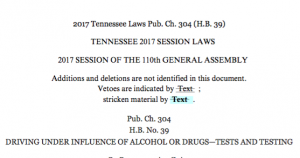 Effective July 1, 2017, Tennessee is making sweeping changes to its Implied Consent Law[1] in an apparent attempt to comply with the recent U.S. Supreme Court decision, Birchfield v. North Dakota, 136 S.Ct. 2160 (2016). The Implied Consent Law and the Birchfield decision both address legal issues surrounding chemical tests to determine the alcohol and/or drug content in a person’s system. Specifically, they deal with the question of when and under what circumstances a blood or breath test may be requested or required, and the procedures a law enforcement officer must follow in order for the results of that test to be admissible in court.
Effective July 1, 2017, Tennessee is making sweeping changes to its Implied Consent Law[1] in an apparent attempt to comply with the recent U.S. Supreme Court decision, Birchfield v. North Dakota, 136 S.Ct. 2160 (2016). The Implied Consent Law and the Birchfield decision both address legal issues surrounding chemical tests to determine the alcohol and/or drug content in a person’s system. Specifically, they deal with the question of when and under what circumstances a blood or breath test may be requested or required, and the procedures a law enforcement officer must follow in order for the results of that test to be admissible in court.
The most notable change to the Tennessee law, derived directly from the Birchfield opinion, is that the statue creates two distinct categories of chemical tests: breath tests and blood tests. In the Birchfield opinion, the U.S. Supreme Court held that breath tests and blood tests are fundamentally different types of searches within the meaning of the Constitution. Therefore, each requires separate standards for determining the constitutionality of the specific test.
The new version of T.C.A. § 55-10-406 mirrors this distinction. Each type of test has its own standards for when and how to administer the test so that its results are admissible in court. It is worth noting that urine tests to determine the alcohol or drug content in a person’s system are no longer even mentioned in the statute as an alternative to be requested by the officer.
Within the section of the statute that deals with breath tests, as opposed to blood tests, the legislature has established two situations: when a breath test may be administered, and when a breath test shall be administered. The decision of whether to administer a breath test is discretionary in most circumstances, but a breath test is required in certain circumstances. The circumstances in which an officer shall administer a breath test are when the officer has probable cause to believe the defendant has committed a crime of: (1) DUI; (2) Vehicular Assault; (3) Aggravated Vehicular Assault; (4) Vehicular Homicide due to the driver’s intoxication; or (5) Aggravated Vehicular Homicide, AND one or more of the following scenarios exists: (a) the defendant is involved in an accident resulting in the injury or death of another; (b) the defendant has a passenger under the age of 16 years; or (c) the defendant has a prior conviction for one of the above-named offenses. It should be noted that these “mandatory” circumstances were also considered mandatory for both blood and breath tests in the old version of T.C.A. § 55-10-406. Now, only a breath test is mandatory in these circumstances.
Except in the three scenarios listed above, the officer’s decision to administer a breath test is discretionary when the officer has probable cause to believe the driver has committed one of the above five enumerated offenses. The 2017 Implied Consent Law lists five circumstances under which a breath test may be administered: (1) implied consent; (2) actual consent; (3) pursuant to a search warrant, absent consent; (4) incident to a lawful arrest; or (5) when the breath test is mandatory, as discussed in the previous paragraph.
Stay tuned for further discussion of this new law in the near future.
[1] Tenn. Code Ann. § 55-10-406
About the Author: Steven Oberman has been licensed in Tennessee since 1980, and successfully defended over 2,500 DUI defendants. Among the many honors bestowed upon him, Steve served as Dean of the National College for DUI Defense, Inc. (NCDD) and currently serves as chair of the National Association of Criminal Defense Lawyers DUI Committee. Steve was the first lawyer in Tennessee to be Board Certified as a DUI Defense Specialist by the NCDD.
He is the author of DUI: The Crime & Consequences in Tennessee, updated annually since 1991 (Thomson-West), and co-author with Lawrence Taylor of the national treatise, Drunk Driving Defense, 7th edition (Wolters Kluwer/Aspen). Steve has served as an adjunct professor at the University of Tennessee Law School since 1993 and has received a number of prestigious awards for his faculty contributions. He is a popular international speaker, having spoken at legal seminars in 30 states, the District of Columbia and three foreign countries.
The author would like to thank his associate attorney, Anna Rickels, for her research and contributions to this article.
If you would like to contact the author, please visit: http://www.tndui.com